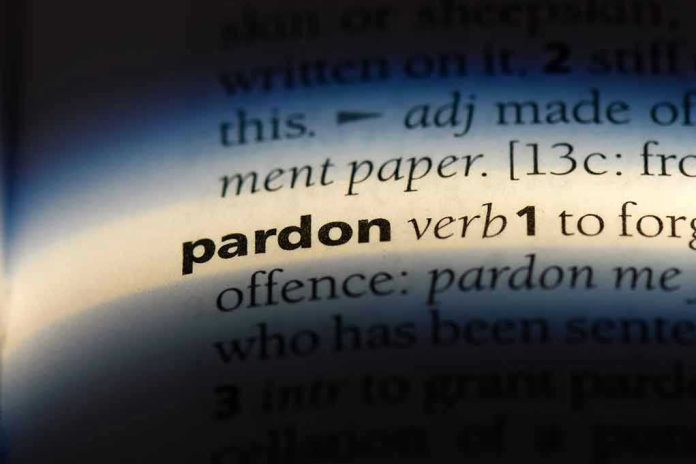
A convicted killer-cop who once shared a cell with Jeffrey Epstein is now banking on Trump’s reputation as the “pardon President” to secure his freedom, highlighting how the president’s controversial clemency record continues to fuel expectations among desperate criminals.
Story Snapshot
- Nicholas Tartaglione, former police officer convicted of murder and Epstein’s ex-cellmate, seeks presidential pardon
- Trump earned “pardon President” nickname for granting clemency to 237 individuals, many political allies
- RFK Jr. ally reportedly backing Tartaglione’s pardon campaign despite his quadruple murder conviction
- Trump’s unprecedented use of pardon power bypassed traditional Justice Department review processes
Convicted Killer Banking on Trump’s Clemency Legacy
Nicholas Tartaglione, the disgraced former police officer convicted of quadruple murder in 2023, represents the latest example of how Trump’s liberal use of presidential pardons has created expectations among convicted criminals. Tartaglione, who gained notoriety as Jeffrey Epstein’s cellmate before the financier’s death, maintains his innocence and reportedly referenced Trump’s reputation for pardons in communications with associates. His case demonstrates how Trump’s controversial clemency decisions continue to influence criminal defendants’ strategies even after leaving office.
Trump’s Unprecedented Pardon Strategy Rewarded Political Allies
During his presidency, Trump granted clemency to 237 individuals, fundamentally departing from traditional pardon practices by focusing on political allies and personal connections rather than cases of genuine injustice. High-profile beneficiaries included Michael Flynn, Roger Stone, and Paul Manafort—all individuals connected to Trump’s political orbit. This approach bypassed the Department of Justice’s standard review process, which historically evaluated pardons based on rehabilitation, acceptance of responsibility, and service to community. Trump’s method prioritized loyalty and political advantage over established criteria.
Constitutional Authority Becomes Political Tool
The presidential pardon power, enshrined in Article II of the Constitution, was designed to correct injustices and show mercy in exceptional circumstances. However, Trump’s implementation transformed this solemn responsibility into what critics describe as a reward system for allies and a tool for undermining accountability. Legal scholars noted the “chaotic” and “unprecedented” nature of Trump’s clemency actions, particularly the concentration of pardons among individuals convicted of public corruption. This represents a concerning departure from the Founders’ intention to use executive clemency as a check on judicial overreach, not as protection for political cronies.
Dangerous Precedent Undermines Rule of Law
Trump’s pardon legacy creates lasting damage to public trust in government accountability and the equal application of justice. By pardoning individuals based on personal relationships rather than merit, Trump sent a clear message that political connections can override criminal convictions. This precedent encourages other convicted individuals, like Tartaglione, to pursue political strategies rather than focusing on genuine rehabilitation or legal appeals. The erosion of traditional pardon standards threatens the constitutional principle that no one is above the law—a cornerstone of American justice that conservatives have long championed.
Jeffrey Epstein’s killer-cop former cellmate pushing for pardon, backed by RFK Jr. ally: report https://t.co/HIRHx7N1yt
— ConservativeLibrarian (@ConserLibrarian) September 22, 2025
The spectacle of a quadruple murderer seeking presidential clemency through political connections represents everything wrong with weaponizing executive power for personal gain. True conservative governance demands accountability, not the corruption of constitutional authority to reward loyalty over justice.
Sources:
Trump’s Legacy: Pardoning Public Corruption – Campaign Legal Center
How Trump and Past Presidents Have Wielded Presidential Pardon Powers – CBS News
List of People Granted Executive Clemency in the First Trump Presidency – Wikipedia
Presidential Pardons and the Rule of Law – William & Mary Bill of Rights Journal









